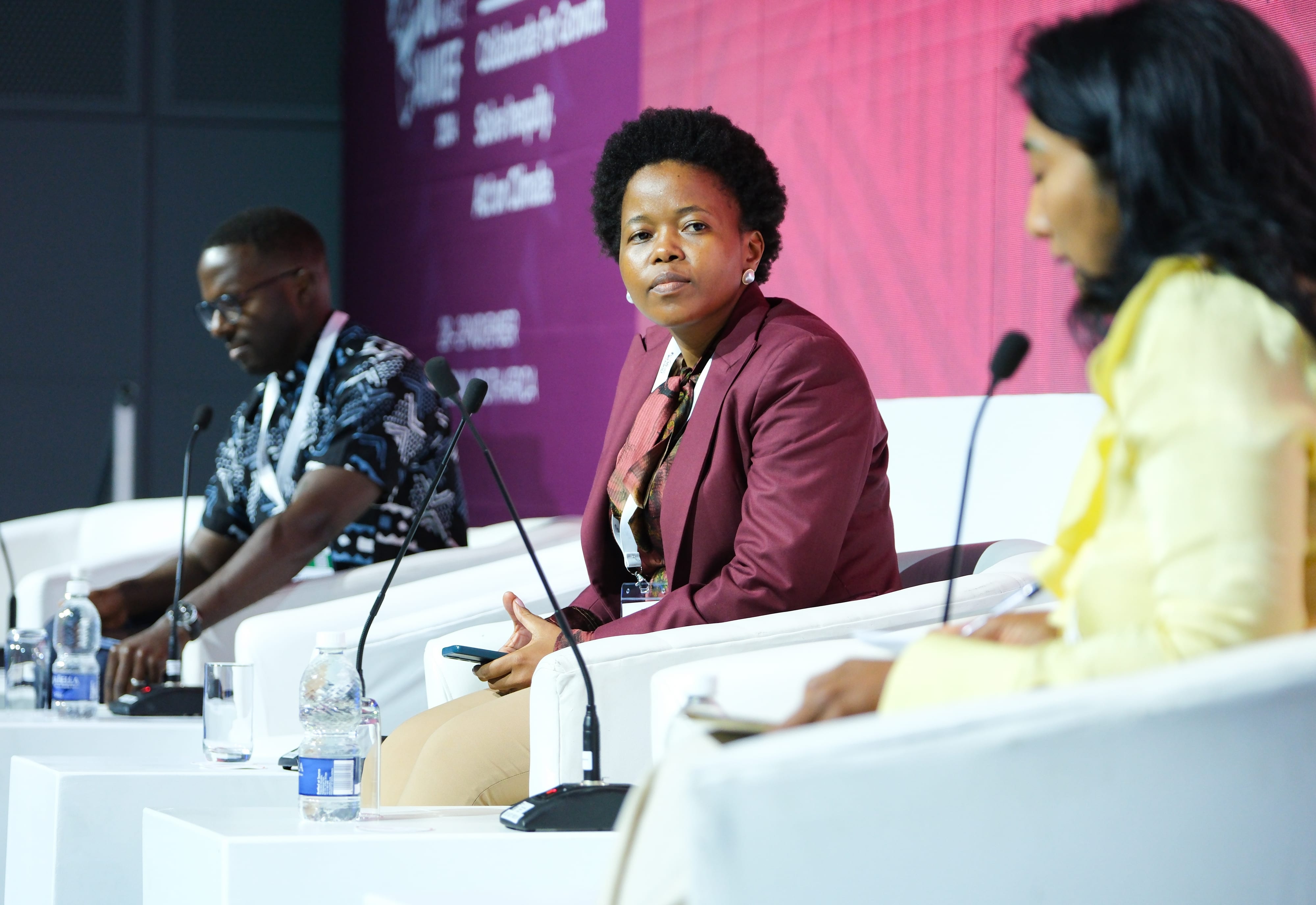Financing for Gender Equality: sharing insights from AWIEF.
Dec 12, 2024
The Africa Women Innovation & Entrepreneurship Forum (AWIEF) is an award-winning non-profit organisation focused on empowering women entrepreneurs across Africa to grow their businesses and reach their full potential. Granted Special Consultative Status with the United Nations Economic and Social Council (ECOSOC), its mission is to foster women’s economic inclusion through comprehensive entrepreneurship support and development programmes. Its vision is an inclusive and thriving Africa, where women-owned businesses are empowered to create and grow high-impact, sustainable enterprises that contribute significantly to Africa’s GDP and overall economic growth.
Now in its 10th year, AWIEF held its annual conference and awards in Cape Town in November, convening key stakeholders around the theme, Future for All: Collaborate for Growth. Solve Inequity. Act on Climate. The event serves as a vital advocacy platform, championing policies and practices that support diversity, inclusion and gender equality in business.

GIF’s Acting CEO, Joseph Ssentongo, spoke on a panel focussed on ‘Financing for Gender Equality’ alongside Nonzuzo Makanda, Executive Director of National Financial Literacy Advocacy, and moderator Nirmala Reddy of Nedbank. Here are three key issues that Joseph addressed:
What are the systemic barriers that hinder women from scaling their businesses, specifically regarding accessing finance?
Systemic barriers vary per country. They are deeply rooted in laws, institutions and practices, and manifest themselves in different ways. But in order to scale, you need to be able to "enter" into business in the first place!
If you are not safe from violence or do not have access to decent and affordable childcare, and don't have adequate control of your assets - all issues which prevail beyond the African continent - you already start with a challenge. And this has an intergenerational effect that unfortunately penalises women and girls.
At GIF, we believe that an important starting point is investing in gender transformative innovations that can change cultural norms. Women entrepreneurs often face societal biases that view them as less creditworthy. According to the World Bank, in sub-Saharan Africa, women are 20% less likely than men to access formal financial institutions.
A further barrier is that traditional financial institutions often demand land or property as collateral, which women frequently lack. According to 2022 research by the Africa Development Bank, only 10% of women in Africa own titled land compared to 30% of men.
Within GIF’s portfolio of investments, Balloon Ventures addresses these challenges in east Africa by providing "bundled" business support. It supports small and growing businesses through a unique model which combines intensive capacity building support with flexible loans. This comprehensive approach enhances business performance and reduces the perceived risk for lenders in the long run. GIF provided a pilot investment to prove its business model and positioned Balloon Ventures for further investment.
From your expertise, what does financing that prioritises gender equality and inclusive growth look like in practice?
A great example from our portfolio is S4S Technologies, which puts women at the centre of the entire agriculture value chain and demonstrates how it can be both impactful and profitable. S4S transforms women into entrepreneurs at every stage, from processing and preservation to marketing, ensuring increased incomes and sustainable livelihoods. Its decentralised model prioritises women's participation and leadership in agri-business.
However, not all organisations can fit this profile, so we assess every innovation in our portfolio vestment through a gender lens. All our investees collect data on how they are benefiting women and girls, we work with them to see whether they can put greater emphasis on gender outcomes.
We have also adapted our Practical Impact Methodology to quantify gender equality outcomes, focusing on empowerment, agency and changing norms. Thus, in parallel to providing desperately needed patient capital - the type that female entrepreneurs need, we can forecast and track the impacts of the organisations we support. There is an obvious and strong financial rationale to this: businesses, whether they are run by women or not, need to understand women and girls better as customers or consumers.

What role do financial institutions, investors, governments, and international organisations have in unlocking more resources for women entrepreneurs?
Women entrepreneurs are not receiving adequate and meaningful support, and we must address the gap in financial inclusion. A lot of women (and youth) on the African continent are disproportionately represented in the informal sector, for example, and as such face even harder challenges.
GIF applies a Gender Lens Investing approach, using a Gender Equality Marker to evaluate how investments impact women. GIF prioritises investments that advance women’s agency, participation and safety while offering patient capital to foster long-term systemic change.
We encourage others to embrace gender lens investing. As a wider group, we can do better. We should encourage successful portfolio companies to make their "playbooks" public. We should all be comfortable sharing "failures": reviewing and sharing evidence from investments, business models and approaches which haven’t been successful, so we can reflect and build on what we have learned.
Governments obviously play a key role in terms of creating enabling environments and ensuring that legislation is in place which ensures a level playing field for women entrepreneurs.
International organisations, like governments and investors, should not lose sight of the intersectionality between women-led SME growth, and other pressing issues such as health, education and climate change. These interconnected factors collectively determine the resilience of communities, the inclusivity of economies and the sustainability of global development efforts.
